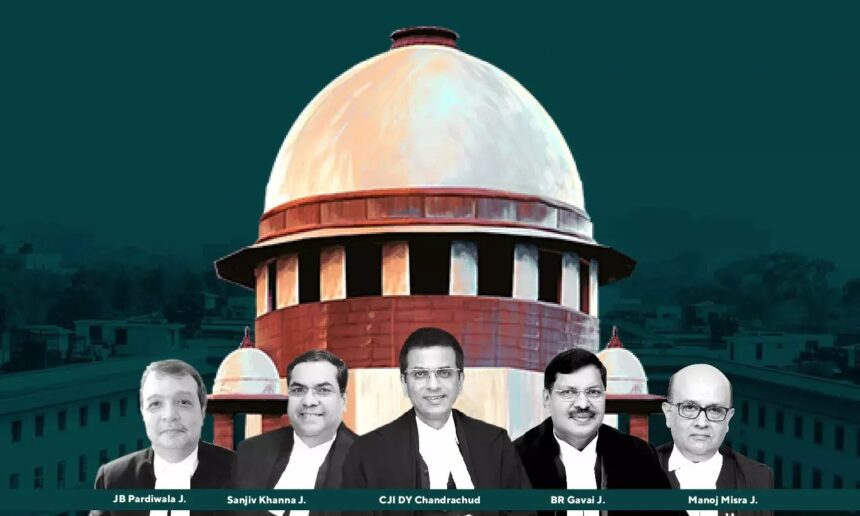New Delhi: The Supreme Court today immediately banned the Electoral Bond Scheme of the Modi government, terming it unconstitutional.
A five-judge Constitution bench of Chief Justice of India (CJI) DY Chandrachud and Justices Sanjiv Khanna, BR Gavai, JB Pardiwala and Manoj Misra unanimously quashed the scheme as well as amendments made to the Income Tax Act and the Representation of People Act which had made the donations anonymous.
Electoral Bonds Judgment
— IndiaToday (@IndiaToday) February 15, 2024
"It's a huge set back to the govt and indeed a major boost for the opposition ahead of Lok Sabha elections"- @sardesairajdeep
Congress leader @KartiPC welcomes the SC decision @pbhushan1 explains#ElectoralBonds #SupremeCourt pic.twitter.com/0r8AHNQKN1
The Court held that the electoral bonds scheme due to its anonymous nature is violative of right to information and thus hits free speech and expression under Article 19(1)(a) of the Constitution.
State Bank of India told by the Supreme Court to stop sale of Electoral Bonds.
State Bank of India told by the Supreme Court to stop sale of #ElectoralBonds#SupremeCourt #SupremeCourtofIndia pic.twitter.com/8HMRWKYPd2
— Bar & Bench (@barandbench) February 15, 2024
What did the Supreme Court say while giving its verdict on the Electoral Bond Scheme:
“Electoral Bonds Scheme, proviso to Section 29(1)(c) as amended by Section 139 of Income Tax Act and Section 13(b) as amended by Finance Act 2017 is violative of Article 19(1)(a),” the judgment said.
The Court held that the scheme will help the party in power to gain advantage.
Political parties directed to refund all amount received.
Finance act 2015 amendments enabling scheme unconditional, Apex court says.
State Bank of India to HEREWITH IMMEDIATELY STOP issuing electoral bonds, And issue details of the political parties that received electoral bonds and all the particulars received to Election Commission by March 6.
By March 13 ECI shall publish it on official website.
Political parties to thereafter refund the Electoral bonds amount to the purchasers account.
Scheme violates right to information, can lead to quid pro quo.
Curbing black money and ensuring anonymity of donors can’t be grounds to defend electoral bonds or need for transparency in political finding.
BREAKING: ELECTORAL BONDS Judgment
— Bar & Bench (@barandbench) February 15, 2024
- POLITICAL PARTIES DIRECTED TO REFUND ALL AMOUNTS RECEIVED
- Finance act 2015 amendments enabling scheme unconditional, Apex court says
- State Bank of India to HEREWITH IMMEDIATELY STOP issuing electoral bonds, And issue details of the… pic.twitter.com/BChwoZ2gh7
What is an Electoral bond scheme?
Electoral bonds are a financial means of donating to political parties. It is like a promissory note which any citizen or company of India can purchase from selected branches of State Bank of India and donate anonymously to any political party of their choice.
The Government of India had announced the Electoral Bond Scheme in 2017. This scheme was legally implemented by the government on 29 January 2018.
Under this scheme, the State Bank of India can issue bonds to provide funds to political parties.
what former Chief Election Commissioner of India SY Quraishi said on the Supreme Court's judgment on Electoral Bonds:
“It is the most historic judgment that we have got from the Supreme Court in the last 5-7 years. It is a great boon for democracy. We were all concerned about it for the last so many years…everyone who loves democracy was protesting about it. I myself wrote several articles and spoke to the media many times. And every issue that we had raised, has been tackled in this judgment,” he said.
VIDEO | Here's what former Chief Election Commissioner of India SY Quraishi (@DrSYQuraishi) said on Supreme Court's judgement on Electoral Bonds.
— Press Trust of India (@PTI_News) February 15, 2024
"It is the most historic judgement that we have got from the Supreme Court in the last 5-7 years. It is a great boon for democracy.… pic.twitter.com/NayI96udLf
Critics have condemned the campaign financing method as an opaque way to funnel “black money” to parties.







